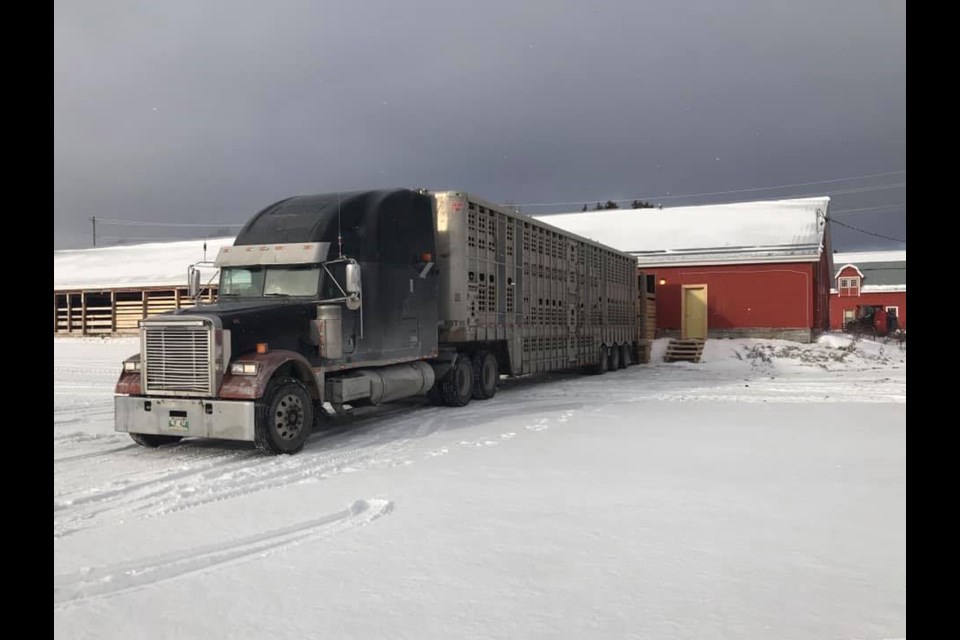Cattle being trucked across the North now have a place to put their hooves up for the night with the opening of the Feed & Water Cow Mootel in Kapuskasing.
Located on the site of the former Kapuskasing Demonstration Farm, just off Highway 11, the bovine rest stop is the creation of Jim and Selina Rogers, who opened the service to customers earlier this fall.
“We’ve been thinking about it for over a year,” Jim said. “We had a barn that wasn’t being used, and so we figured we’d retrofit it and use it for a feed-and-water station.”
Catering primarily to drivers hauling cattle east from Manitoba and Saskatchewan, the facility serves as a stopover for cattle to have a break while on the long trek to their final destination.
Cattle are unloaded, corralled into pens, and provided food and water before continuing on their journey.
The idea was inspired by similar rest stops located at points farther west, including two in Thunder Bay and a third about an hour from Kapuskasing.
“The truckers are needing more options,” Selina said. “It’s another option for them up here, particularly when you get a snowstorm or the road gets shuts down, as it often does.”
Rest stops like theirs have become even more important following the introduction last February of new rules on the humane transportation of animals.
According to the Canadian Food Inspection Agency, truckers transporting animals are now required to stop at regular intervals to let the animals eat, drink and rest for a minimum of eight hours before reloading them and carrying on.
The rules have been in place for nearly a year, but Jim anticipates enforcement will ramp up in the new year, necessitating more stops for long-haul truckers.
Though there aren’t rooms at this mootel for customers of the two-legged variety, there is a shower that drivers can use to freshen up, and a space to rest and grab a bite to eat while waiting.
“We have a kitchen here, and so we just invite the guys to eat with us if they want,” Jim said. “We’ll have our dinner and whatever we’ve got they can share with us.”
For a few dollars more, Jim said, there’s a shop on site that drivers can use to work on their rigs.
On a recent visit, one driver found that option particularly helpful after his truck had broken down and required a new alternator.
Since their location is just five minutes from Kapuskasing’s core, Jim said, the driver was able to run into town, grab the supplies he needed, and get his truck back up and running in no time.
Want to read more stories about business in the North? Subscribe to our newsletter.
Though they’re somewhat new to the area, the Rogers family’s name won’t be entirely unfamiliar to northerners.
They relocated to Kapuskasing from North Battleford, Sask., last year, taking up residence at the demonstration farm after the previous tenant broke the lease with the Town of Kapuskasing.
The former agricultural research farm was established by the federal government in 1916. The Kapuskasing Economic Development Corp. purchased the property and its assets in 2015 with the intention of seeing it continue as a working farm.
Operating as Rogers Crop Enterprises, Jim and Selina grow crops including canola, barley and peas. With plenty of space to spare, Jim said, they saw an opportunity to diversify their holdings.
“We’re a cash crop farm, but we had all these buildings, so we said well, we’ll do something else, try to add to our income,” he said.
Response from both the community and cattle haulers has been positive, Jim said. Kapuskasing is happy to have another business in its midst, while truckers are pleased to see the addition of a new layover on their route.
Jim and Selina said they’re happy to provide the service and are eager to welcome their guests – both the four-legged and two-legged kind – as needed.
“We’re just trying to do everything we can to make their stay as enjoyable as possible and get their cattle taken care of,” Jim said. “We know they’ve got a lot of stress on the road, and so we try to do what we can.”




